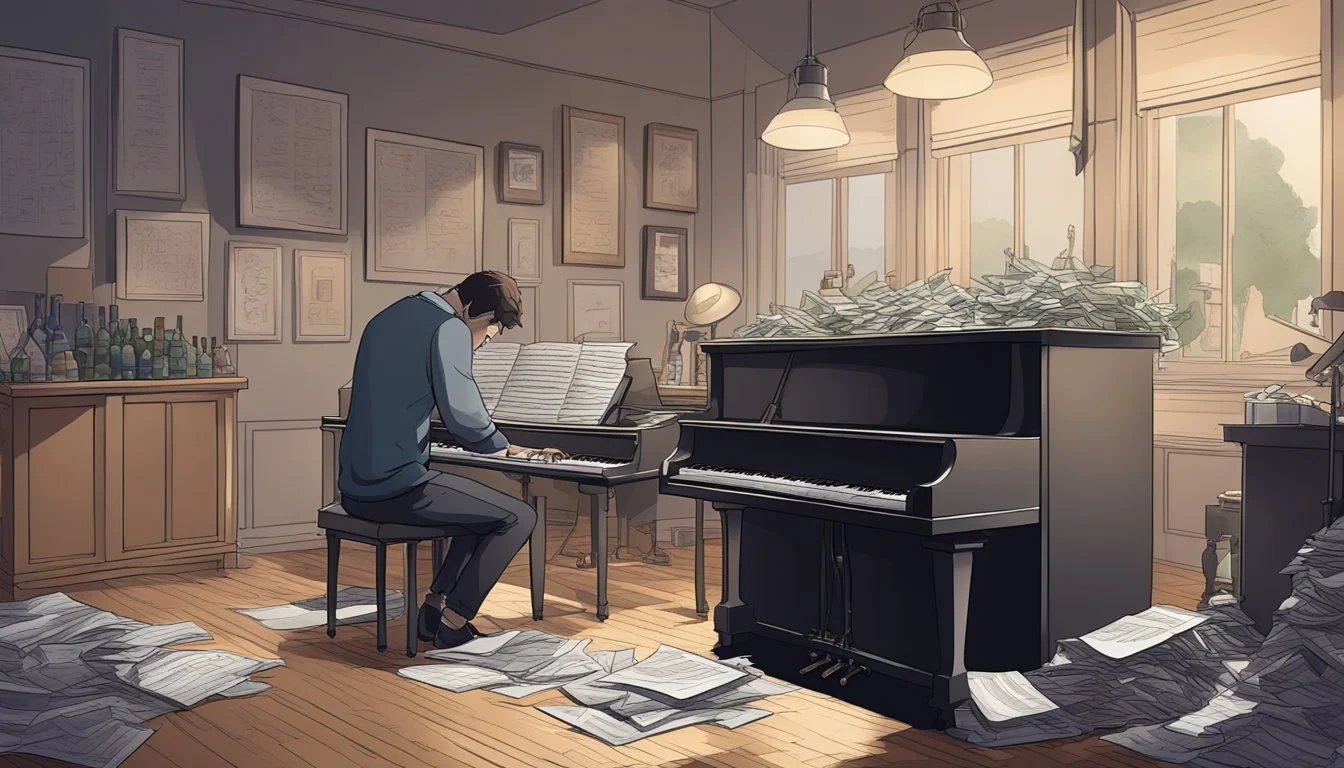Bee Gees' Blues: Maurice Gibb's Struggle Revealed
The Bee Gees, one of the most successful pop groups in history, faced their share of personal struggles behind the glittering facade of fame. Maurice Gibb, one-third of the iconic trio, grappled with depression and substance abuse for much of his adult life.
Maurice Gibb battled alcoholism from the age of 25, a challenge that significantly impacted his personal life and career with the Bee Gees. His wife, Yvonne, noted the toll it took on their relationship and his role in the band. The pressures of stardom and constant touring contributed to Maurice's reliance on alcohol as a coping mechanism.
Despite the group's immense success, including hits like "Staying Alive," Maurice struggled to find happiness in his role as a Bee Gee. The demanding nature of the entertainment industry, combined with his personal demons, created a cycle of addiction that proved difficult to break. His story serves as a reminder of the hidden struggles often faced by those in the public eye.
The Rise of the Bee Gees
The Bee Gees' journey from obscure Australian band to global superstars spans over a decade of musical evolution and chart-topping hits. Their rise to fame transformed the music industry and left an indelible mark on popular culture.
Formation and Early Success
The Bee Gees formed in 1958 in Manchester, England. Brothers Barry, Robin, and Maurice Gibb began performing together as children. After moving to Australia, they gained local popularity and released their first single in 1963.
The group returned to England in 1967, signing with manager Robert Stigwood. Their breakthrough came with "New York Mining Disaster 1941," which reached the top 20 in both the UK and US charts.
The Bee Gees' early sound blended folk and pop influences. Hit songs like "To Love Somebody" and "Massachusetts" showcased their tight harmonies and emotional lyrics. By the late 1960s, they had established themselves as talented songwriters and performers.
The Height of Disco
In the mid-1970s, the Bee Gees embraced disco music. This shift revitalized their career and led to massive commercial success. The 1975 album "Main Course" marked their transition to a more R&B-influenced sound.
"Jive Talkin'" became their first US number-one hit in years. The follow-up single "You Should Be Dancing" topped charts worldwide. These disco-infused tracks showcased Barry's distinctive falsetto and the group's tight harmonies.
The Bee Gees' new sound resonated with audiences and club-goers. They quickly became leading figures in the disco movement, crafting infectious dance hits that defined an era.
Saturday Night Fever and Fame
The 1977 film "Saturday Night Fever" catapulted the Bee Gees to unprecedented levels of fame. Their contributions to the soundtrack, including "Stayin' Alive," "How Deep Is Your Love," and "Night Fever," became instant classics.
The album sold over 40 million copies worldwide. It remains one of the best-selling albums of all time. The Bee Gees won five Grammy Awards for their work on the soundtrack.
At the peak of their success, the brothers wrote and produced hits for other artists. Their songwriting prowess extended beyond their own performances. The Bee Gees' influence on popular music was undeniable, cementing their status as music industry legends.
Maurice Gibb's Personal Struggles
Maurice Gibb faced significant personal challenges throughout his life, battling addiction and coping with family tragedy. His struggles impacted both his career and relationships.
Family and Brotherly Bonds
Maurice Gibb shared a close bond with his brothers Barry and Robin as part of the Bee Gees. The trio's success brought fame and fortune, but also intense pressure. Their younger brother Andy's death in 1988 deeply affected Maurice and the entire family.
Maurice often played peacemaker between Barry and Robin during conflicts. His role as the stabilizing force in the group was crucial to their longevity.
The loss of Andy at such a young age due to drug-related issues cast a shadow over the Gibb family. It served as a stark warning about the dangers of substance abuse.
Substance Abuse and its Impact
Maurice struggled with alcohol addiction for many years. His drinking problem escalated in the 1970s during the height of the Bee Gees' fame.
The partying lifestyle common in the music industry fueled his addiction. Maurice also experimented with other substances, including amphetamines.
His substance abuse affected his professional life, sometimes leading to erratic behavior during performances. It also strained his relationships with family members and bandmates.
Maurice's addiction contributed to health issues later in life. He underwent treatment multiple times in attempts to overcome his dependency.
Public and Private Suffering
While the Bee Gees maintained a polished public image, Maurice's struggles often remained hidden from fans. He battled depression privately, exacerbated by the pressures of fame and his substance abuse issues.
Maurice's wit and humor often masked his inner turmoil. He was known for practical jokes and lighthearted behavior, which sometimes concealed deeper emotional pain.
The public nature of his career made it difficult to seek help discreetly. Maurice faced the challenge of maintaining his image while dealing with personal demons.
Despite these difficulties, Maurice continued to contribute to the Bee Gees' success. His musical talents remained evident even during his darkest periods.
Health Battles and Untimely Death
Maurice Gibb faced serious medical challenges in his later years. His health struggles culminated in a sudden hospitalization and tragic passing at age 53.
Multiple Health Issues
Maurice battled alcoholism for years before achieving sobriety in the early 1990s. He maintained his recovery for over a decade prior to his death.
In 2003, Maurice experienced severe abdominal pain. Doctors discovered he had an intestinal blockage caused by a twisted bowel, a condition known as volvulus.
This rare but dangerous issue required emergency surgery. Complications arose quickly, putting enormous strain on Maurice's body.
The Final Days
On January 9, 2003, Maurice was rushed to Mount Sinai Medical Center in Miami Beach. He underwent urgent abdominal surgery to address the intestinal blockage.
During the procedure, Maurice suffered cardiac arrest. Doctors were unable to revive him.
On January 12, 2003, Maurice Gibb passed away. His family, including wife Yvonne and children Adam and Samantha, were by his side.
An autopsy revealed the intestinal twisting was likely a congenital condition Maurice had since birth. This tragic health issue ultimately led to his untimely death at just 53 years old.
Legacy and Tributes
Maurice Gibb's contributions to music and his impact on the industry continue to resonate years after his passing. His work with the Bee Gees has inspired countless artists and left an indelible mark on popular culture.
The Bee Gees' Influence on Music
The Bee Gees, with Maurice as an integral member, shaped the sound of disco and pop music. Their harmonies and songwriting techniques influenced generations of musicians across genres. The group's ability to evolve their sound over decades demonstrated their versatility and musical prowess.
Maurice's skills on bass and keyboard were essential to the Bee Gees' distinctive sound. His contributions to hits like "Stayin' Alive" and "How Deep Is Your Love" remain iconic in the music industry.
The band's impact extended beyond their own performances. They wrote and produced successful tracks for other artists, further cementing their legacy in the music world.
Tribute Projects and Albums
Several tribute projects have honored Maurice Gibb and the Bee Gees since his passing. Barry Gibb released "Greenfields: The Gibb Brothers Songbook, Vol. 1" in 2021, featuring collaborations with country artists.
This album included performances by:
Dolly Parton
Miranda Lambert
Keith Urban
Little Big Town
Brandi Carlile
Jason Isbell
Other notable tributes include performances by Olivia Newton-John, Sheryl Crow, and Alison Krauss. These projects have introduced Bee Gees classics to new audiences and genres.
Continuing Impact and Remembrance
The 2020 documentary "The Bee Gees: How Can You Mend a Broken Heart," directed by Frank Marshall, brought renewed attention to the group's legacy. It featured interviews with Barry Gibb and archive footage of Maurice, providing insights into their creative process and personal lives.
The film received critical acclaim and a Grammy nomination, highlighting the enduring interest in the Bee Gees' story. It also shed light on Maurice's struggles with addiction and his role within the band.
Maurice Gibb's musical contributions continue to be celebrated through various events, tribute concerts, and reissues of classic Bee Gees material. His influence on bass playing and arranging in pop music remains a topic of study for musicians and music historians alike.
Influence and Relationships
Maurice Gibb's musical talents and collaborations shaped both the Bee Gees' sound and the wider music industry. His role within the group was crucial, though often understated.
Collaborations with Other Artists
Maurice Gibb worked with several iconic musicians outside the Bee Gees. He collaborated with John Lennon on the song "Crippled Inside" for Lennon's 1971 album "Imagine." Gibb also teamed up with Elton John, contributing backing vocals on "Crocodile Rock."
In 1978, Maurice worked with Paul McCartney on a track called "Sea of Heartbreak." This collaboration highlighted Gibb's versatility and respect among his peers.
During the disco era, Maurice's bass playing and keyboard skills were sought after by numerous artists. He contributed to albums by Andy Gibb, Barbra Streisand, and Diana Ross.
Maurice Gibb's Role Within The Bee Gees
Maurice was often considered the glue that held the Bee Gees together. His harmonizing abilities were crucial to the group's distinctive sound. He played multiple instruments, including bass, keyboard, and guitar.
In the studio, Maurice was known for his technical expertise and innovative ideas. He often acted as a mediator between his brothers Barry and Robin during creative disagreements.
Maurice's contributions to the Bee Gees' arrangement and production were significant, especially during their disco phase. His bass lines and synthesizer work were key elements in hits like "Stayin' Alive" and "Night Fever."
Despite his vital role, Maurice often took a back seat in terms of public recognition. He was content to support his brothers and focus on the music rather than the spotlight.




